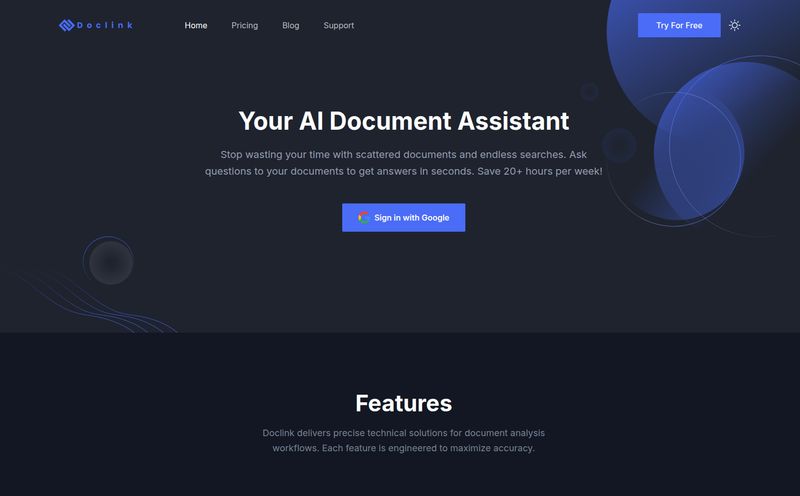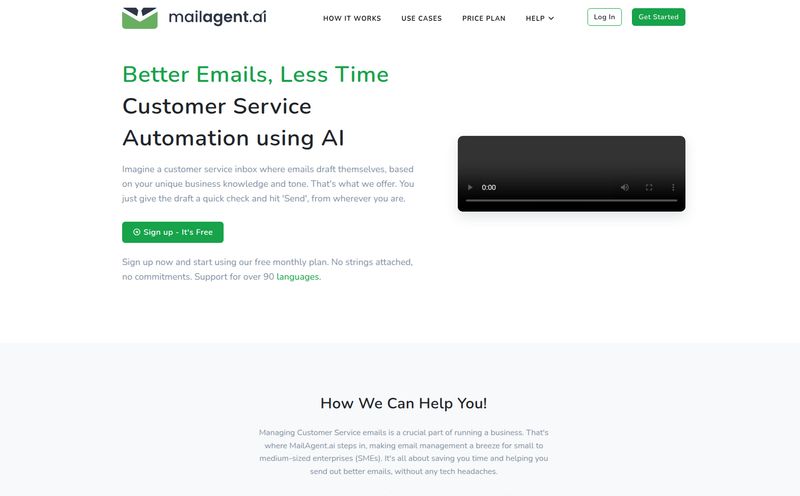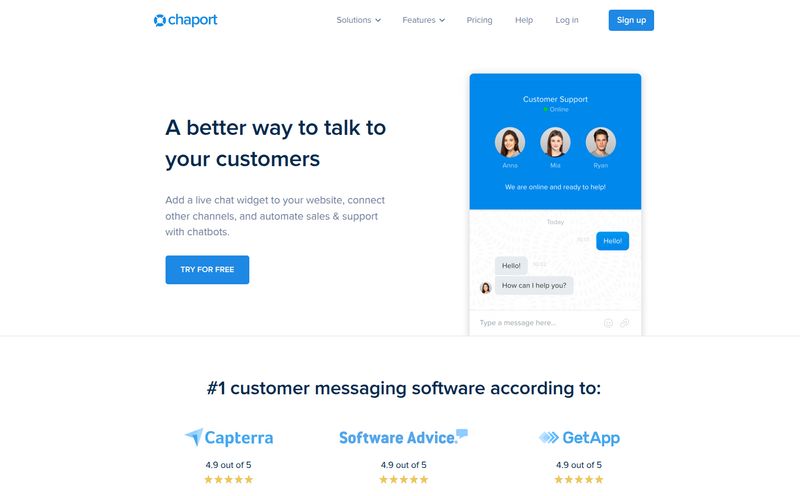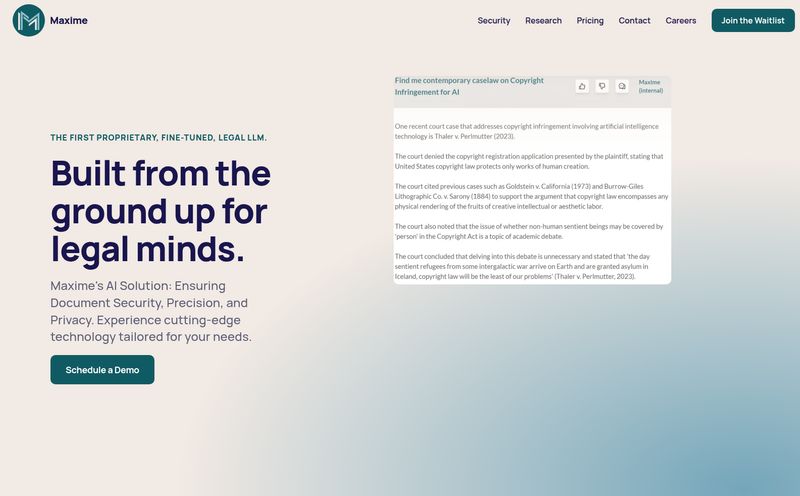I’ve been in the SEO and traffic game for what feels like an eternity. And if there’s one constant, it’s the noise. Not just the noise of a million competitors, but the noise from our own customers. Feedback from Intercom, tickets in Zendesk, App Store reviews, angry tweets, feature requests sent via carrier pigeon… okay, maybe not the last one. But you get it. It’s a firehose of information, and most of us are trying to catch it in a teacup.
For years, the solution was grunt work. Spreadsheets. Manual tagging. Late nights fueled by stale coffee, trying to turn a mountain of qualitative comments into a single, coherent bar chart for the Monday morning meeting. It was, frankly, soul-crushing.
Then came the AI revolution, promising to save us all. A new tool pops up every week claiming to be the magic bullet. So, when I came across ClientZen, I was naturally skeptical. Another platform promising to automate feedback analysis? Sure. But I had to see for myself. Is this just another dashboard, or is it the real deal?
What Exactly is ClientZen Supposed to Do?
Let's get this straight. ClientZen isn't just another inbox or a fancy data visualizer. It positions itself as an analytics engine. The whole idea is to plug in all your feedback sources—and they boast over 80 integrations, including the big ones like Intercom and Zendesk—and let its AI do the heavy lifting. It reads, understands, and categorizes everything for you.
Think of it less like a tool and more like hiring a team of hyper-fast, multilingual analysts who work 24/7 and never complain. Their only job is to read every single piece of customer feedback and tell you what actually matters. A pretty compelling pitch, I have to admit.
My First Impressions: The Good, The Bad, and The AI
Getting started felt straightforward enough. Hooking up a few data sources was painless. But the real test is what happens next. Does it just create a word cloud, or does it provide something… useful?
The Magic of Automated Tagging
This is where I started to get a little bit excited. I remember once spending an entire week trying to manually categorize support tickets for a quarterly report. It was mind-numbing. ClientZen claims to cut down time spent on feedback analysis by 80%, and honestly? I believe it. Almost instantly, feedback starts getting tagged and sorted into topics. Things like 'Bug Report', 'Feature Request', 'Pricing Concern'—all without me creating a single rule.
It automatically identifies what customers are talking about, the sentiment behind it, and even starts spotting trends. It’s the kind of thing that frees up a Product Manager or a Customer Success lead to do their actual job instead of being a data entry clerk.
"Just Ask Mantra AI" - A Gimmick or a Godsend?
Every tool has an AI copilot these days. It's the new dark mode. So, I approached ClientZen's "Mantra AI" with a healthy dose of cynicism. You get a search bar and you can just… ask it questions. In plain English.
So I tried it.
Show me the biggest pain points for new users in the last 30 days.
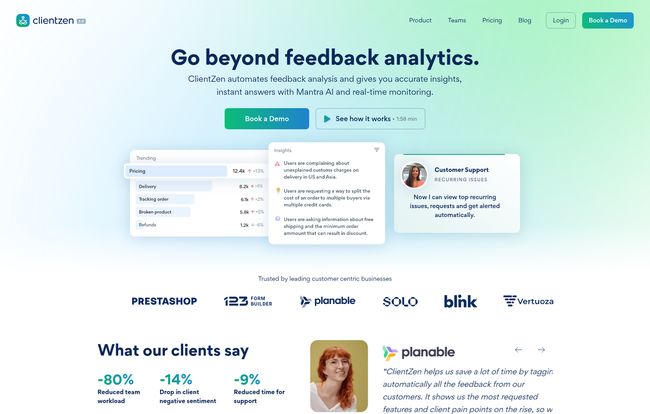
Visit ClientZen
Instead of me having to filter by user segment, then search for keywords like "confusing," "stuck," and "can't find," Mantra AI just spat out a summary with links to the source conversations. That was the moment. That’s not a gimmick. That’s a genuine time-saver. It felt less like using software and more like briefing an assistant. A very, very smart assistant.
Let's Talk Brass Tacks: The Core Features That Matter
Beyond the initial 'wow' factor, a tool has to have substance. Here’s what stood out to me in day-to-day use.
- Real-Time Monitoring: We've all been burned by a bad release. The beauty here is that you're not waiting for a quarterly survey to find out you broke something. You can see a spike in negative sentiment around a specific feature almost immediately. It’s about catching small fires before they become raging infernos.
- Finding the "Why": The platform is really good at identifying negative sentiment drivers. It doesn’t just tell you 15% of customers are unhappy. It tells you they’re unhappy because the new UI update moved a button they used every day. That's the kind of actionable insight that prevents customer churn. It’s the difference between data and wisdom.
- A Universe of Integrations: I can’t overstate how important this is. Feedback is scattered. Having a tool that can pull from Zendesk, social media, email, and call transcripts all at once is the only way to get a true 360-degree view of the customer experience.
Okay, But How Much Does This Magic Cost? A Look at ClientZen's Pricing
Alright, let's talk about the elephant in the room: the price. Great features are only great if you can afford them. ClientZen has a tiered structure that seems aimed at different stages of a company's growth. I've broken it down into a simple table because, let's face it, pricing pages can be a maze.
| Plan | Price | Key Features & Limits |
|---|---|---|
| Essential | €190 / month | Includes the core insights, Mantra AI, and release tracking. Limited to 1,000 conversations/month. No data cleaning or advanced segmentation. |
| Pro | €690 / month | Adds advanced segmentation, anomaly detection, data cleaning, and data exports. Limited to 5,000 conversations/month. |
| Enterprise | Let's Talk | All Pro features plus customer journey mapping, unlimited conversations, a dedicated success manager, and custom options. |
The Essential plan feels like a solid entry point for a startup or a small business that's just starting to get serious about customer feedback. The 1,000 conversation limit is something to watch, though. The Pro plan is where it gets serious, unlocking the segmentation and data cleaning that larger teams really need. The Enterprise plan is the full-service buffet for companies where customer feedback is a mission-critical operation.
The Not-So-Rosy Side: Potential Downsides to Consider
No tool is perfect. Let's be real. The biggest thing that jumps out at me are the conversation limits on the Essential and Pro plans. If you're a B2C company with high ticket volume, you could blow past 5,000 conversations in a week. This seems much better suited for B2B SaaS companies with lower, but higher-value, interaction volumes.
Also, holding back features like data cleaning and advanced segmentation for the Pro plan is a classic SaaS move, but it's a bit of a bummer. Clean data is pretty foundational, and I'd love to see it included in the lower tier. It's a strategic choice on their part, but one you need to be aware of before you sign up.
My Final Take: Is ClientZen Worth the Investment?
So, we circle back to the main question. Is it worth it?
In my opinion, if you're a Product Manager, Customer Success Lead, or founder who is personally feeling teh pain of manual feedback analysis, the answer is a resounding yes. The value isn't in the reports it generates; it's in the hours it gives back to you. It's in making a data-driven decision with confidence because you're not just going on gut feelings or the last three angry emails you read.
Who should pass? If you're a very early-stage startup with a handful of customers, you can probably still manage with a spreadsheet. But the moment you feel that sense of drowning, that’s your cue to look into a tool like this.
The cost might seem steep at first glance, but you have to weigh it against the cost of your time, or worse, the cost of building a product your customers don't actually want. For my money, I'd rather pay for clarity.
Frequently Asked Questions
- Is there a free trial for ClientZen?
- Yes, the site mentions a 30-day free trial, and you don't need a credit card to get started, which is always a good sign.
- How is ClientZen different from other feedback tools?
- While many tools aggregate feedback, ClientZen's main differentiator seems to be the depth of its AI analysis. The automated topic and sentiment tagging, plus the natural language query feature (Mantra AI), go a step beyond a simple unified inbox.
- Can I cancel or change my plan anytime?
- Yes, their FAQ indicates that you can easily change or cancel your plan, offering some flexibility as your needs change.
- What kind of security does ClientZen have?
- They mention data encryption at rest and in transit. For any company handling customer data, this is a non-negotiable, so it's good to see they're addressing it upfront.
- What happens if I go over my monthly conversation limit?
- This is a great question to ask their sales team during a demo. Typically, SaaS companies will either automatically upgrade you to the next tier or have some kind of overage fee. It's crucial to clarify this beforehand.
- Does it integrate with tools like Slack or Microsoft Teams?
- While the site highlights integrations with feedback sources like Zendesk and Intercom, you would need to check their full integration list or ask them about workflow tools like Slack. The Enterprise plan does offer custom integrations, so it's likely possible.
Conclusion
The flood of customer feedback isn't going to slow down. If anything, it’s only going to get louder and more complex. Trying to manage it manually is becoming less of a strategy and more of a liability. Tools like ClientZen represent a necessary shift, moving us from simply collecting data to actually understanding it. It’s not about finding a bigger teacup to catch the firehose with; it's about building a system that automatically filters, purifies, and bottles the water for you. And that, to me, is a pretty powerful thing.
Reference and Sources
- ClientZen Official Website
- ClientZen Pricing Page
- An Article on the Importance of Voice of the Customer (VoC) Programs by Hotjar
